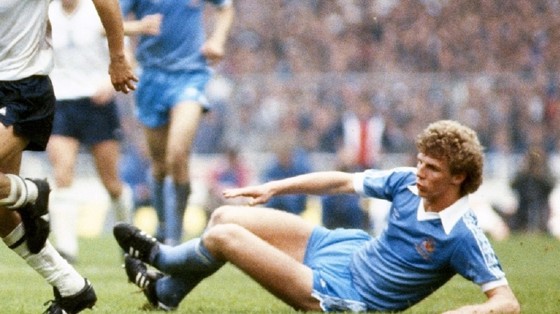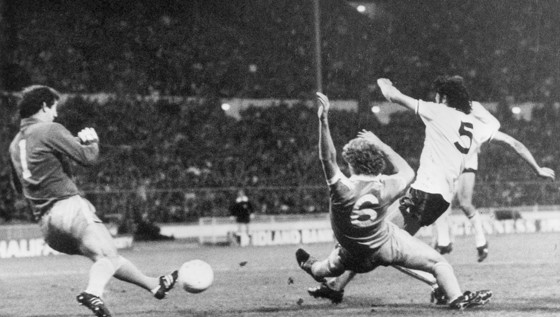Tipped to be a future England captain, the Kirkby-born teenager with a shock of blond curly hair, represented Liverpool Boys and England Under-16s before being snapped by City for the 1978/79 campaign.
CITY+ - Free to Cityzens until football resumes
He quickly became an integral figure of the youth and reserve sides and played in both legs of the 1979 FA Youth Cup final against Millwall – City losing 2-0 on aggregate – but he had already caught the attention of the first team management.
Malcolm Allison had returned to take the reins for the 1979/80 campaign and having sold off a host of established internationals during the summer, he instead focused on youth.

In many ways, there was nobody better than Big Mal to fast-track Caton into the senior set-up.
For the opening First Division game of the 1979/80 campaign, the 16-year-old Caton and 17-year-old new signing Steve Mackenzie were handed their debuts against Crystal Palace.
Caton would align his new senior duties along with continuing to lead the youth team in important games, later appearing in City’s second consecutive run to the FA Youth Cup final, again playing in both legs of the final that City lost 3-2 on aggregate to Aston Villa.
Caton was a superb find for Allison and, incredibly, the teenager played in all 42 league games in his first full season with the first team - and when Allison was sacked a few months into the 1980/81, new manager John Bond had no hesitation on keeping Caton as part of his defence.
Caton would experience a third successive year of final heartache – this time with the first team - as City were beaten by Tottenham in the 1981 FA Cup final replay.

Such was his growing influence, he was voted the MCFC Player of the Year for 1981/82 – in a team that included Trevor Francis, Dennis Tueart and Joe Corrigan – the youngest ever recipient aged 19.
During the 1982/83 campaign, Caton also became the youngest player to reach 100 top flight appearances, aged just 19 years and five months, but as City dramatically were relegated on the last day of the season with a 1-0 home loss against Luton Town, so Caton decided his future lay elsewhere.
He began the 1983/84 season alongside his regular defensive partner Nicky Reid, but for such a highly-rated talent, the second tier was not the best place for his continued development and when Arsenal had a bid of £500,000 accepted in December 1983, the youngster was on his way south.
Clearly the Gunners had earmarked Caton as a potential signing after he scored both goals for City in a 2-1 win over them the previous season.
Still only 21, he’d made two games shy of 200 appearance for City, scored eight goals and served the Club with great distinction and still had his whole career ahead of him.

Capped 14 times by England Under-21s, it seemed a call-up to the senior side was imminent for Caton, but strangely, it never came.
His time with Arsenal saw several managerial changes (he’d already witnessed four at City) and his form seemed to suffer as a result. Though he played 35 games in his first campaign, partway through his second season at Highbury he lost his place to another emerging talent, Martin Keown.
His third campaign saw him slip further down the pecking order with Tony Adams and David O’Leary now the first choice pairing with Keown waiting in the wings, and so in February 1987, Caton accepted the chance to transfer to Oxford United who paid £160,000 for his services.
He would stay for 18 months at the Manor Ground, moving on to Charlton Athletic in November 1988 where he picked up a nasty ankle injury during his second season.
Caton battled for three years to recover from the injury, but he would never play again and finally was forced to retire in March 1993 aged 30.
A father of three young children, tragically, Tommy died of a heart attack on 30 April 1993 –27 years ago today - just a few weeks after calling time on his career.
Caton – or TC as he was affectionately known - remains one of the best young defenders City have ever produced and we can only wonder where he might have led the Club had he emerged at a more stable period.







